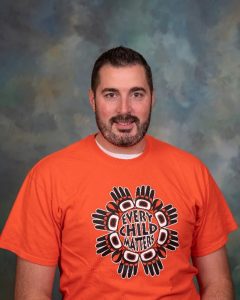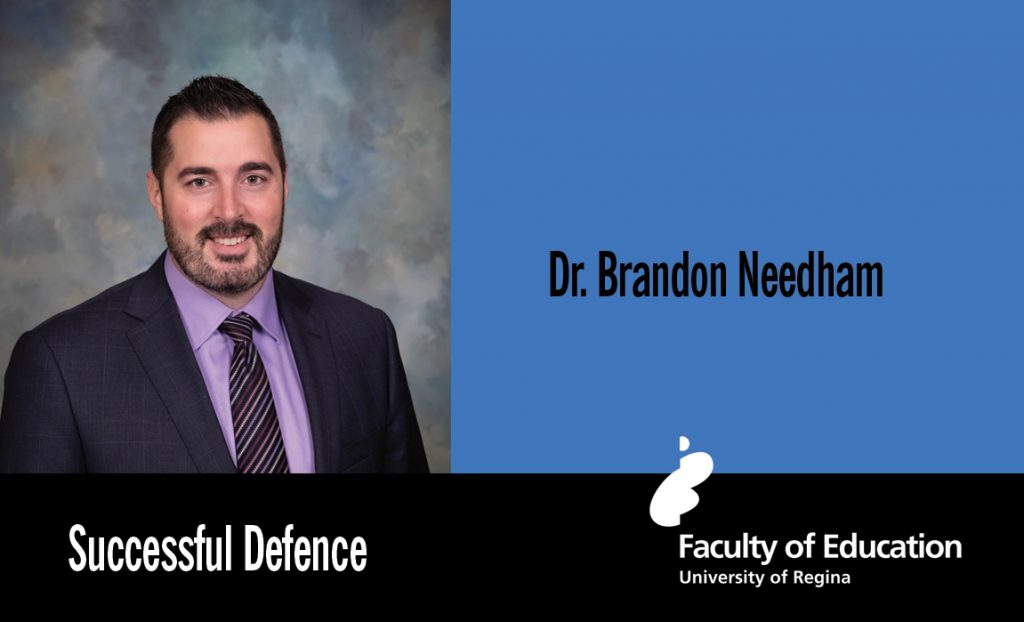An interview with Dr. Brandon Needham, Principal of Melville Comprehensive School (MCS) and 2020 CBC Future 40 Winner, who successfully defended his dissertation, “Critical Action Research: How One School Community Lives out the Truth and Reconciliation Commission’s Calls to Action,” on February 16, 2021. Co-supervisors were Dr. Twyla Salm and Dr. Jennifer Tupper. Committee members were Dr. Michael Cappello, Dr. Anna-Leah King, and Dr. Amber Fletcher. External examiner was Dr. Nicholas Ng-A-Fook (University of Ottawa).
Why did you choose to do your graduate degree at the Faculty of Education, University of Regina?
I completed a Bachelor of Arts degree in history, Bachelor of Education – major in physical education and minor in history, and a Master’s degree in curriculum studies from the University of Saskatchewan (U of S). I chose the University of Regina (U of R) for my doctoral work based on the reputation of the school, specifically, the notable research being conducted in the area of treaty and Indigenous education. My supervisor, and former U of R Dean of Education, Dr. Jennifer Tupper’s seminal work in treaty education became the basis to explore areas of reconciliation education.
The University of Regina was also one of the only doctoral programs not requiring a one-year residency for doctoral students, which allowed me to study and continue my job as an in-school administrator. This was very important for me, as I was not able to take an education leave from my school division to pursue a doctorate. The flexibility in the graduate programs at the U of R makes academia more accessible to those educators who still want to remain connected to a K-12 context and for that I was grateful.
What were the circumstances that led you to your research topic for your dissertation?
Having enrolled in the winter term of 2015, just as the Truth and Reconciliation Commission’s final report and the subsequent release of the Calls to Action occurred, this topic seemed timely. Prior to choosing this topic, I had conducted a research project with Dr. Michael Cottrell from the U of S on the implementation of treaty education through treaty catalyst teachers. My doctoral work was an evolution of this earlier work, which sought to investigate the challenges and opportunities in teaching students about the Indian Residential School (IRS) project.
What need were you identifying?
In my time as a classroom teacher and an in-school administrator, I have identified hesitancy from students and staff to engage fully in the teaching and learning of treaty education, and other Indigenous topics found in the curriculum. This was initially the case for me, too, as I began my teaching career. Having grown up in a town void of experiences with Indigenous peoples, I had to (un)learn many of the things I had come to know about Indigenous peoples. Through my various educational experiences, I gained a more nuanced understanding of myself as a White settler and the privilege that accompanies that position. Wanting to create meaningful change in my school community towards the goals of the TRC, this project offered the opportunity to invite others to consider their privileged positions. Much of the research conducted to this point had been with teacher-candidates; I felt that conducting the research project in my school may serve to help clarify the complexities of reconciliatory work in K-12 contexts.
Briefly outline your research question and findings.
The study was informed by the following research question: “What actions can a school community take to engage in the TRC Calls to Action to become a site where truth and reconciliation become possible?”
The findings of the study have been encapsulated in the following way: By living out the Calls to Action in our school community we learned to:
Begin with ourselves
- Locate oneself in the context of settler-colonialism by confronting the various ways we have and continue to be shaped by it.
- Understand the context of where the work is happening, seeking to understand the community we wish to transform.
- Build capacity in ourselves so as to engage respectfully in difficult conversations we encountered on our journey of reconciliation.
- Practice critical reflection and understand that the journey toward reconciliation is on-going and evolves with time.
Walk alongside Indigenous peoples on this journey
- Bear witness to truth-telling (survivor stories and other Indigenous counter-stories).
- Build and foster respectful relationships with Indigenous community members.
- Create a support network (Indigenous organizations, community groups, academic institutions) to assist in the journey.
Engage in disruptive work
- Work collectively and collaboratively to transform the teaching and learning of the residential school project, treaty education, Indigenous sovereignty, and ongoing colonial violence.
- Encourage and influence those around us to include and infuse Indigenous perspectives, values, and cultural understanding into daily practice.
- Transform the spaces and places in the school to reflect the historical significance of Indigenous peoples.
Recognize the potential of schools and individuals in schools to be vehicles for reconciliatory actions.
What was memorable, a highlight about doing this research?
A highlight of doing this research project was having been fortunate enough to share this journey with the colleagues who participated in the study. Our group met several times over the course of the school year in the hope to live out the TRC Calls to Action in our school, which led to many meaningful conversations about the influence we have as teachers to make reconciliation more than aspirational.
What kinds of feedback have you received from others?
I have received very positive feedback from others. I have had an opportunity to share my findings through virtual conferences, with only positive comments coming from those sessions.
Were there any unexpected moments of grace coming out of your studies during a pandemic?
I would say an unexpected moment of grace that came out of this pandemic was shown by my supervisor, Dr. Tupper. She was extremely supportive and understanding of the challenges I faced as a graduate student, principal, and father of four children.
What are your hopes for how your work is taken up by others?
My hope is that this work is taken up in ways that continue to invite others to consider their positionality in our settler-colonial system and how they might use their privilege to explore the shared history between Indigenous and non-Indigenous peoples. More work is needed in how students take up and experience reconciliation education and it is my hope that this project can illuminate some of those possibilities.

Follow us on social media
